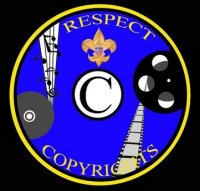PLEASE CIRCULATE AND POST WIDELYTed Striphas and Kembrew McLeod announce the release of the complete contents of
Cultural Studies 20(2/3) (March/May 2006), a special issue on "The Politics of Intellectual Properties." By special agreement with the publisher, Taylor & Francis, the issue can be downloaded free of charge from
http://www.indiana.edu/~bookworm and
http://kembrew.com/academics/research.html.
About the issue: This special issue of
Cultural Studies aims to create a genuinely interdisciplinary scholarly discussion of the politics of intellectual properties. While many areas of study pay lip service to the idea of interdisciplinary work, one remarkable thing about recent intellectual property research is the way it has produced an actual cross-pollination of scholarship. Drawing together prominent scholars from multiple disciplines, this issue of
Cultural Studies speaks to many significant topical intersections--from library science, computer science, and the biological sciences to popular music, film studies, and media studies, to name a few. In addition to presenting compelling, cutting-edge research, this issue explores what cultural studies can contribute to public conversations about the politics of intellectual properties.
Issue Table of Contents:(1) Ted Striphas & Kembrew McLeod, “Introduction—Strategic Improprieties: Cultural Studies, the Everyday, and the Politics of Intellectual Properties”
(2) Adrian Johns, “Intellectual Property and the Nature of Science”
(3) McKenzie Wark, “Information Wants to be Free (But is Everywhere in Chains)”
(4) Andrew Herman, Rosemary J. Coombe, & Lewis Kaye, “Your Second Life? Goodwill and the Performativity of Intellectual Properties in On-Line Games”
(5) Steve Jones, “Reality© and Virtual Reality©: When Virtual and Real Worlds Collide”
(6) Jane Gaines, “Early Cinema, Heyday of Copying: The Too Many Copies of L’arroseur arose”
(7) Gilbert B. Rodman & Cheyanne Vanderdonckt, “Music for Nothing or, I Want My MP3: The Regulation and Recirculation of Affect”
(8) David Sanjek, “Ridiculing the 'White Bread Original': The Politics of Parody and Preservation of Greatness in Luther Campbell a.k.a. Luke Skyywalker et al. v. Acuff-Rose Music, Inc.”
(9) Eva Hemmungs Wirtén, “Out of Sight and Out of Mind: On the Cultural Hegemony of Intellectual Property (Critique)”
(10) Siva Vaidhyanathan, “Afterword—Critical Information Studies: A Bibliographic Manifesto”
(11) Patricia R. Zimmermann, “Just Say No: Negativland's No Business”
 Courtesy of Sivacracy, here's the Free Culture movement's response to the "Respect Copyright" merit badges now being issued to upstanding Boy Scouts living in and around the Los Angeles area. (Take a look at my post below for more information about the BSA's intellectual property-related initiative.) I gather that "copyleft" is the gist of the patch, which only exists in mock-up.
Courtesy of Sivacracy, here's the Free Culture movement's response to the "Respect Copyright" merit badges now being issued to upstanding Boy Scouts living in and around the Los Angeles area. (Take a look at my post below for more information about the BSA's intellectual property-related initiative.) I gather that "copyleft" is the gist of the patch, which only exists in mock-up. 
